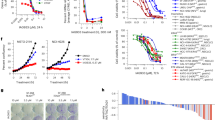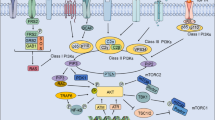Abstract
Pancreatic ductal adenocarcinoma (PDAC) is an aggressive neoplastic disease. Gemcitabine, the currently used chemotherapeutic drug for PDAC, elicits only minor benefits, because of the development of escape pathways leading to chemoresistance. Herein, we aimed at investigating the involvement of the mitogen activating protein kinase interacting kinase (MNK)/eIF4E pathway in the acquired drug resistance of PDAC cells. Screening of a cohort of PDAC patients by immunohistochemistry showed that eIF4E phosphorylation correlated with disease grade, early onset of disease and worse prognosis. In PDAC cell lines, chemotherapeutic drugs induced MNK-dependent phosphorylation of eIF4E. Importantly, pharmacological inhibition of MNK activity synergistically enhanced the cytostatic effect of gemcitabine, by promoting apoptosis. RNA interference (RNAi) experiments indicated that MNK2 is mainly responsible for eIF4E phosphorylation and gemcitabine resistance in PDAC cells. Furthermore, we found that gemcitabine induced the expression of the oncogenic splicing factor SRSF1 and splicing of MNK2b, a splice variant that overrides upstream regulatory pathways and confers increased resistance to the drug. Silencing of SRSF1 by RNAi abolished this splicing event and recapitulated the effects of MNK pharmacological or genetic inhibition on eIF4E phosphorylation and apoptosis in gemcitabine-treated cells. Our results highlight a novel pro-survival pathway triggered by gemcitabine in PDAC cells, which leads to MNK2-dependent phosphorylation of eIF4E, suggesting that the MNK/eIF4E pathway represents an escape route utilized by PDAC cells to withstand chemotherapeutic treatments.
This is a preview of subscription content, access via your institution
Access options
Subscribe to this journal
Receive 50 print issues and online access
$259.00 per year
only $5.18 per issue
Buy this article
- Purchase on Springer Link
- Instant access to full article PDF
Prices may be subject to local taxes which are calculated during checkout






Similar content being viewed by others
References
Kern SE, Shi C, Hruban RH . The complexity of pancreatic ductal cancers and multidimensional strategies for therapeutic targeting. J Pathol 2011; 223: 295–306.
Falasca M, Selvaggi F, Buus R, Sulpizio S, Edling CE . Targeting phosphoinositide 3-kinase pathways in pancreatic cancer--from molecular signaling to clinical trials. Anticancer Agents Med Chem 2011; 11: 455–463.
Sun SY, Rosenberg LM, Wang X, Zhou Z, Yue P, Fu H et al. Activation of Akt and eIF4E survival pathways by rapamycin mediated mammalian target of rapamycin inhibition. Cancer Res 2005; 65: 7052–7058.
Wang X, Yue P, Chan C, Ye K, Ueda T, Watanabe-Fukunaga R et al. Inhibition of Mammalian Target of Rapamycin Induces Phosphatidylinositol 3-Kinase Dependent and Mnk-Mediated Eukaryotic Translation Initiation Factor 4E Phosphorylation. Mol Cell Biol 2007; 27: 7405–7413.
Zoncu R, Efeyan A, Sabatini DM . mTOR: from growth signal integration to cancer, diabetes and ageing. Nat Rev Mol Cell Biol 2011; 12: 21–35.
Culjkovic B, Topisirovic I, Skrabanek L, Ruiz-Gutierrez M, Borden KL . eIF4E promotes nuclear export of cyclin D1 mRNAs via an element in the 3′ UTR. J Cell Biol 2005; 169: 245–256.
Mamane Y, Petroulakis E, Rong L, Yoshida K, Ler LW, Sonenberg N . eIF4E – from translation to transformation. Oncogene 2004; 23: 3172–3179.
Ueda T, Watanabe-Fukunaga R, Fukuyama H, Fukuyama H, Nagata S, Fukunaga R . Mnk2 and Mnk1 are essential for constitutive and inducible phosphorylation of eukaryotic initiation factor 4E but not for cell growth or development. Mol Cell Biol 2004; 24: 6539–6654.
Buxade M, Parra-Palau JL, Proud CG . The Mnks: MAP kinase-interacting kinases (MAP kinase signal-integrating kinases). Front Biosci 2008; 13: 5359–5373.
Zhang Y, Li Y, Yang D . Phosphorylation of eIF-4E positively regulates formation of the eIF-4F translation initiation complex following DNA damage. Biochem Biophys Res Commun 2008; 367: 54–59.
Bianchini A, Loiarro M, Bielli P, Busà R, Paronetto MP, Loreni F et al. Phosphorylation of eIF4E supports protein synthesis, cell cycle progression and proliferation in prostate cancer cells. Carcinogenesis 2008; 29: 2279–2288.
Konicek BW, Stephens JR, McNulty AM, Robichaud N, Peery RB, Dumstorf CA et al. Therapeutic inhibition of MAP kinase interacting kinase blocks eukaryotic initiation factor 4E phosphorylation and suppresses outgrowth of experimental lung metastases. Cancer Res 2011; 71: 1849–1857.
Altman JK, Glaser H, Sassano A, Joshi S, Ueda T, Watanabe-Fukunaga R et al. Negative Regulatory Effects of Mnk Kinases in the Generation of Chemotherapy-Induced Antileukemic Responses. Mol Pharmacol 2010; 78: 778–784.
Wendel HG, Silva RL, Malina A, Mills JR, Zhu H, Ueda T et al. Dissecting eIF4E action in tumorigenesis. Genes Dev 2007; 21: 3232–3237.
Furic L, Rong L, Larsson O, Koumakpayi IH, Yoshida K, Brueschke A et al. eIF4E phopshorylation promotes tumorigenesis and is associated with prostate cancer progression. Proc Natl Acad Sci USA 2010; 107: 14134–14139.
Ueda T, Sasaki M, Elia AJ, Chio II, Hamada K, Fukunaga R et al. Combined deficiency for MAP kinase-interacting kinase 1 and 2 (Mnk1 and Mnk2) delays tumor development. Proc Natl Acad Sci USA 2010; 107: 13984–13990.
Graff JR, Konicek BW, Lynch RL, Dumstorf CA, Dowless MS, McNulty AM et al. eIF4E activation is commonly elevated in advanced human prostate cancers and significantly related to reduced patient survival. Cancer Res 2009; 69: 3866–3873.
Yoshizawa A, Fukuoka J, Shimizu S, Shilo K, Franks TJ, Hewitt SM et al. Overexpression of phopsho-eIF4E is associated with survival through AKT pathway in non-small-cell lung cancer. Clin Cancer Res 2010; 16: 240–248.
Chrestensen CA, Eschenroeder A, Ross WG, Ueda T, Watanabe-Fukunaga R, Fukunaga R et al. Loss of MNK function sensitizes fibroblasts to serum-withdrawal induced apoptosis. Genes Cells 2007; 12: 1133–1140.
Scheper GC, Parra JL, Wilson M, Van Kollenburg B, Vertegaal AC, Han ZG et al. The N and C termini of the splice variants of the human mitogen-activated protein kinase-interacting kinase Mnk2 determine activity and localization. Mol Cell Biol 2003; 23: 5692–5705.
Karni R, De Stanchina E, Lowe SW, Sinha R, Mu D, Krainer AR . The gene encoding the splicing factor SF2/ASF is a proto-oncogene. Nat Struct Mol Biol 2007; 14: 185–193.
David CJ, Chen M, Assanah M, Canoll P, Manley JL . HnRNP proteins controlled by c-Myc deregulate pyruvate kinase mRNA splicing in cancer. Nature 2010; 463: 364–368.
Bielli P, Busà R, Paronetto MP, Sette C . The RNA-binding protein Sam68 is a multifunctional player in human cancer. Endocr Relat Cancer 2011; 18: 91–102.
Assouline S, Culjkovic B, Cocolakis E, Rousseau C, Beslu N, Amri A et al. Molecular targeting of the oncogene eIF4E in AML: a proof-of principle clinical trial with ribavirin. Blood 2009; 114: 257–260.
Wolpin BM, Hezel AF, Abrams T, Blaszkowsky LS, Meyerhardt JA, Chan JA et al. Oral mTOR inhibitor everolimus in patients with gemcitabine-refractory metastatic pancreatic cancer. J Clin Oncol 2008; 27: 193–198.
Gonçalves V, Theisen P, Antunes O, Medeira A, Ramos JS, Jordan P et al. A missense mutation in the APC tumor suppressor gene disrupts an ASF/SF2 splicing enhancer motif and causes pathogenic skipping of exon 14. Mutat Res 2009; 662: 33–36.
Sanz DJ, Acedo A, Infante M, Durán M, Pérez-Cabornero L, Esteban-Cardeñosa E et al. A high proportion of DNA variants of BRCA1 and BRCA2 is associated with aberrant splicing in breast/ovarian cancer patients. Clin Cancer Res 2010; 16: 1957–1967.
Hayes GM, Carrigan PE, Miller LJ . Serine-arginine protein kinase 1 overexpression is associated with tumorigenic imbalance in mitogen-activated protein kinase pathways in breast, colonic, and pancreatic carcinomas. Cancer Res 2007; 67: 2072–2080.
Hayes GM, Carrigan PE, Beck AM, Miller LJ . Targeting the RNA splicing machinery as a novel treatment strategy for pancreatic carcinoma. Cancer Res 2006; 66: 3819–3827.
Busà R, Paronetto MP, Farini D, Pierantozzi E, Botti F, Angelini DF et al. The RNA-binding protein Sam68 contributes to proliferation and survival of human prostate cancer cells. Oncogene 2007; 26: 4372–4382.
Pedrotti S, Bielli P, Paronetto MP, Ciccosanti F, Fimia GM, Stamm S et al. The splicing regulator Sam68 binds to a novel exonic splicing silencer and functions in SMN2 alternative splicing in spinal muscular atrophy. EMBO J 2010; 29: 1235–1247.
O’Loghlen A, Gonzalez VM, Pineiro D, Pérez-Morgado MI, Salinas M, Martín ME . Identification and molecular characterization of Mnk1b, a splice variant of human MAP kinase-interacting kinase Mnk1. Experimental Cell Res 2004; 299: 343–355.
Acknowledgements
We wish to thank Professor CG Proud for the generous gift of MNK2a and MNK2b plasmids, Professor A Scarpa for the gift of HPAF2 cells, Dr Enrica Bianchi for help with FACS analysis, Dr Maria Antonietta Talerico for technical support with immunohistochemistry and Dr Alessia Di Florio for helpful suggestions throughout the study. This work was supported by funds from the Associazione Italiana Ricerca sul Cancro (AIRC IG10348) and Association for International Cancer Research (AICR).
Author information
Authors and Affiliations
Corresponding authors
Ethics declarations
Competing interests
The authors declare no conflict of interest.
Additional information
Supplementary Information accompanies the paper on the Oncogene website
Supplementary information
Rights and permissions
About this article
Cite this article
Adesso, L., Calabretta, S., Barbagallo, F. et al. Gemcitabine triggers a pro-survival response in pancreatic cancer cells through activation of the MNK2/eIF4E pathway. Oncogene 32, 2848–2857 (2013). https://doi.org/10.1038/onc.2012.306
Received:
Revised:
Accepted:
Published:
Issue Date:
DOI: https://doi.org/10.1038/onc.2012.306
Keywords
This article is cited by
-
An electrostatically conjugated-functional MNK1 aptamer reverts the intrinsic antitumor effect of polyethyleneimine-coated iron oxide nanoparticles in vivo in a human triple-negative cancer xenograft
Cancer Nanotechnology (2023)
-
Splicing alterations in pancreatic ductal adenocarcinoma: a new molecular landscape with translational potential
Journal of Experimental & Clinical Cancer Research (2023)
-
The plasticity of mRNA translation during cancer progression and therapy resistance
Nature Reviews Cancer (2021)
-
The miR-361-3p increases enzalutamide (Enz) sensitivity via targeting the ARv7 and MKNK2 to better suppress the Enz-resistant prostate cancer
Cell Death & Disease (2020)
-
SRSF1 mediates cytokine-induced impaired imatinib sensitivity in chronic myeloid leukemia
Leukemia (2020)



